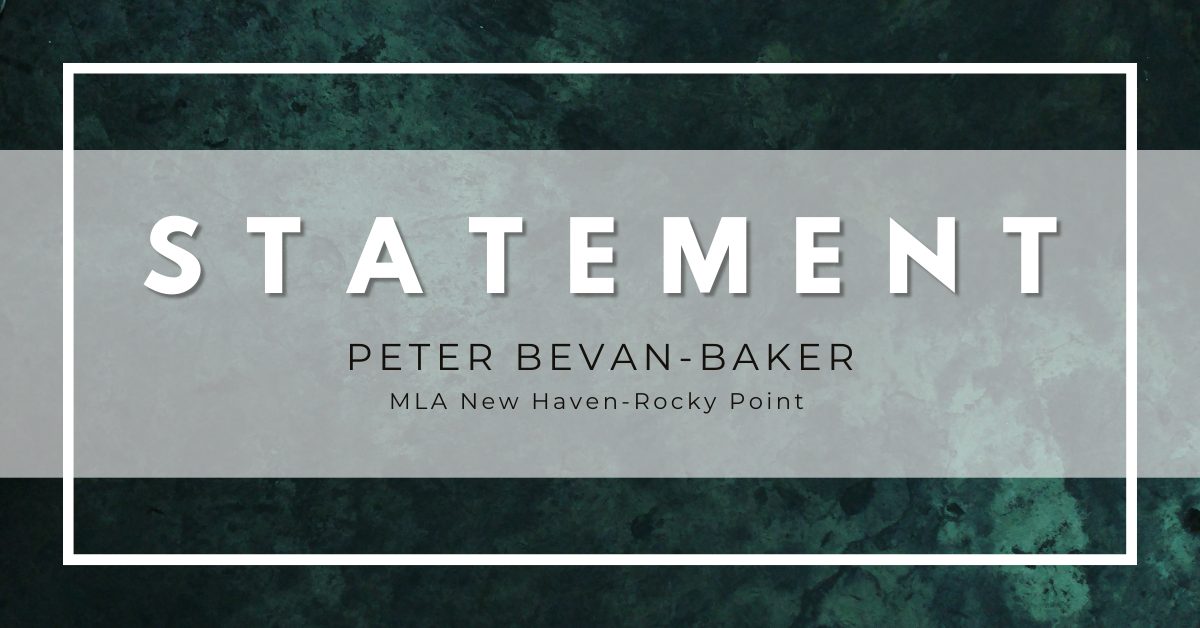FOR IMMEDIATE RELEASE
July 5, 2023
Statement by Peter Bevan-Baker on Clean Fuel Regulation and the Cost of Inaction on Climate Change
I got into politics because I wanted to leave a liveable planet for my children, and now my grandchildren. The climate crisis is the most serious and immediate threat to our beloved Island, the people who live here, our economy, and indeed the entire planet.
Recently, our Premier came out in opposition to the federal Clean Fuel Regulation, a key climate policy to reduce carbon emissions (specifically transportation emissions) in Canada. He is not only leading a coalition against needed climate policy—he is cynically downplaying the role he could and should be playing to help Islanders adapt. While playing on Islanders’ fears might be a smart, if cynical political move, I’m afraid it is actually hurting us.
Transportation in Context
Transportation is our largest source of greenhouse gas emissions on PEI, representing 41% of all emissions in 2021. Of these transportation emissions, 72% comes from passenger cars and trucks while the remaining emissions come mostly from freight transportation like heavy trucks, marine transport, and aviation.
The Clean Fuel Regulation is designed to specifically reduce the carbon intensity of fuels we use in transportation, and is a key part of the federal plan to reduce emissions. The federal government estimates the Clean Fuel Regulation will lead to a 26 million tonne reduction of greenhouse gas emissions in 2030. Even industry stakeholders recognize the environmental value of this policy; as the president of the Canadian Fuels Association recently told the CBC, “I want to reassure Canadians that it is a good policy, it is a good regulation, it will deliver significant [emission] reductions.”
Urgent Action Needed
We can’t delay climate action—we have to take strong action immediately. Delay will only contribute to more devastating climate events like Fiona and much higher costs down the road. Time and again studies have shown us that the costs of inaction are far greater than the costs of taking appropriate action today. It is estimated that an investment of $1 today in climate action yields a benefit of $4 down the road.
In my view, the Province is misguided in asking the federal government what the costs associated with the Clean Fuel Regulation will be. Ultimately, the costs will depend on what course of action Canadian oil refineries take to meet their obligations under the Clean Fuel Standard. To this end, what inquiries has our provincial government made to Irving Oil about the costs associated with the Clean Fuel Regulation? And, if the federal Minister of Environment’s recent comments are accurate, why is Irving Oil the only refinery in Canada that is suggesting it will need to pass off costs to consumers in 2023?
There is one possible reason. In its 2017 discussion paper which launched consultations on the Clean Fuel Regulation, the federal government noted that five provinces already had policies in place that met or exceeded the federal requirements for renewable fuel. Notably, none of those provinces were Atlantic Canadian provinces.
Despite knowing for years that the Clean Fuel Regulation was coming, the Atlantic provinces took no apparent steps to work together to ensure we were moving toward a cleaner fuel supply. In fact, our tardy low-carbon fuel uptake is one of the reasons why the Parliament Budget Officer’s report says PEI will face larger impacts relative to most provinces. Even now, it looks like the Atlantic premiers are afraid to challenge our regional fuel providers like Irving Oil to improve their standards. As a result, Islanders will pay the price due to our Premier’s lack of foresight. This is the cost of inaction.
Typical of Government
If Premier King was genuinely concerned about Islanders’ financial wellbeing through this time of change, he would have introduced support programs to help Islanders who might be affected. Maybe the Premier would have drastically expanded his investments in climate-friendly policies like public transit or active transportation infrastructure to reduce transportation-related costs. Instead, the best he can do is a letter-writing campaign. That would be inspiring leadership from a third-grader, but it is totally inadequate from the Premier who controls our province’s $3 billion budget.
This whole situation is typical of the King government, which says the right things but does the wrong things. While Islanders are rightfully fearful of a rising cost of living and their access to healthcare diminishing each day, Premier King distracts by pretending he cares, but nothing ever changes. In fact, if it often feels like things are getting worse, it’s because they are.
Being serious on climate means being honest about climate policy and taking bold action to reduce emissions while supporting Islanders through the transition. Regrettably, the King government is failing Islanders on both counts.
Peter Bevan-Baker
MLA New Haven-Rocky Point
-30-
For media inquiries, please contact:
Katie Rankin
Chief of Staff
Office of the Third Party
Tel: (902) 213-6378
Email: kerankin@assembly.pe.ca

